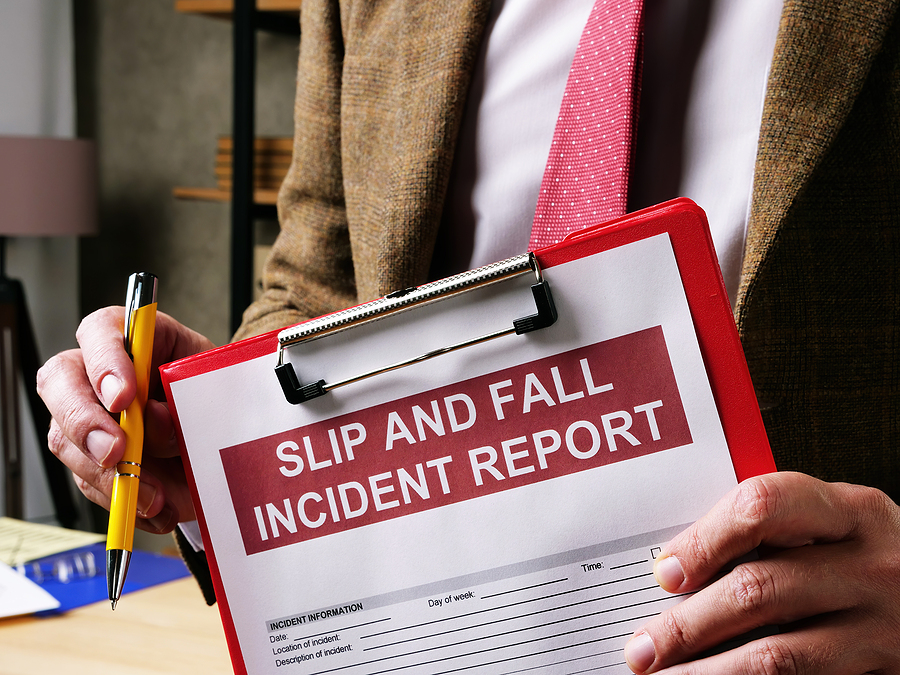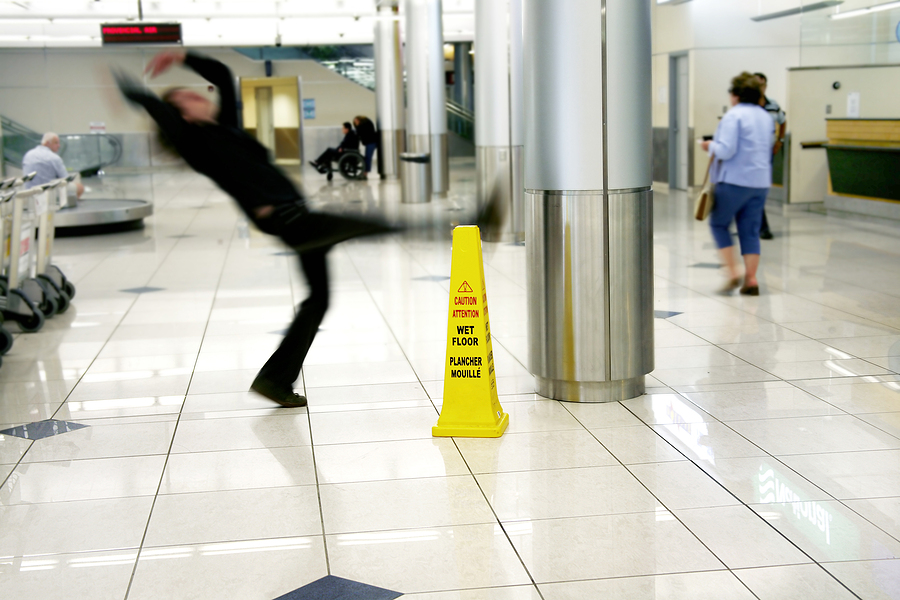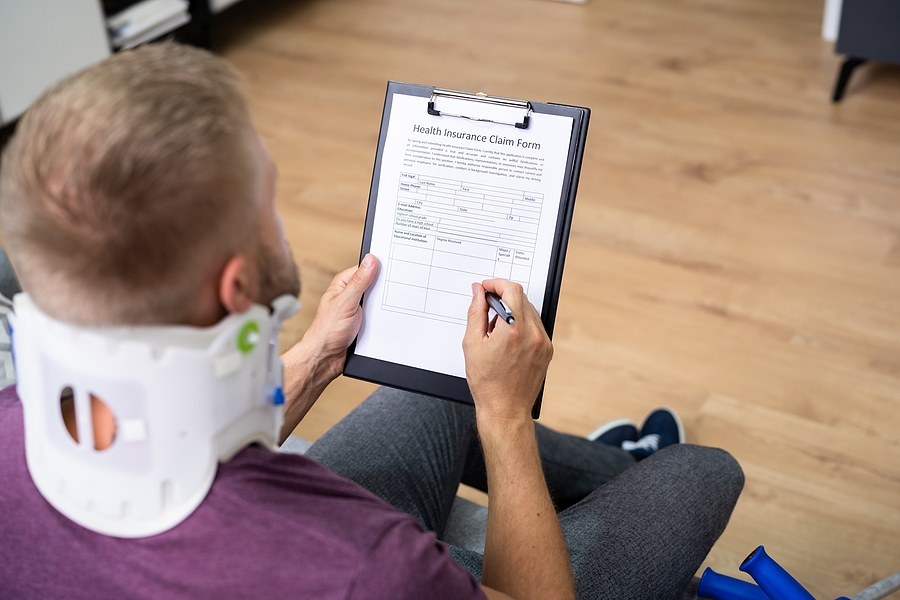S
lip And Fall Accidents
S
lip and fall accidents
YOUR TRUSTED GEORGIA ATTORNEY WITH
THE COURAGE TO FIGHT FOR YOU
Slip And Fall Accidents

They’re played up for comedy but slip and fall accidents are not really funny. The term “slip and fall” is used in personal injury cases where the injured person slipped or tripped while on another person’s property. Most slip and falls come under the greater category of premises liability claims.
From a slipping on a wet floor in a local grocery store or taking a fall after tripping on a piece of unmaintained sidewalk, slip and fall accidents can leave you with serious and sometime long lasting injuries. Injuries may require hospital time and physical rehabilitation and unfortunately cause permanent disability or disfigurement.
Slip and fall accidents in the legal sense are cases where negligence is at the root of the accident. The elements of a premises liability claim are controlled by state law. Under Georgia Code § 51-3-1, property owners and occupiers have a legal duty to keep their premises safe for those who are legally invited, induced, or lead onto their property. They are liable in damages to such persons for injuries caused by the failure to exercise ordinary care in keeping the premises safe.
Joshua Smith is an experienced and dedicated lawyer familiar with Georgia law and can guide you through the claim process. Let us advise you on your legal options and help you recover needed compensation.
Georgia’s Premises Liability Laws

A slip and fall accident that occurs on someone else’s property falls under Georgia’s laws that govern premises liability.
This area of law pertains to injuries sustained by individuals while on someone else’s property at their invitation or inducement. This means a trespasser would not likely enjoy protection under this law. It means that if you are visiting a retail store, business or even your own property complex, you have a reasonable expectation that you will not encounter hazardous conditions.
Central to this area of law is the notion that property owners bear the responsibility and duty of care to maintain a reasonably safe environment for all visitors. Property owners should promptly address any known hazards through regular and proper maintenance and repairs.
For example if a property owner fails to repair or remediate a hazard after being notified by a visitor or tenant, they may be considered negligent. The property owner can being held liable (responsible) for any accidents that occur and the subsequent expenses that the injured party will incur.
Two Year Deadline to File Case
Georgia law includes a two-year statute of limitations for premises liability cases that starts from the date of the accident. If you have suffered an injury, speak with us as quickly as possible so we can file on time. If your loved one is so injured that they are unable to seek our help, please talk with us on their behalf. We can look to protect the rights of the injured and pursue maximum compensation for all injuries and damages.
Proving Liability—Who’s Responsible?
To establish negligence in a Georgia slip and fall personal injury claim, you must satisfy four key points:
1. The defendant had a duty of care towards the plaintiff, which typically entails ensuring the safety of visitors on their property.
2. The defendant failed to fulfill their duty of care, thereby breaching their obligation. This breach may involve inadequate maintenance or failure to address hazards on the property.
3. The negligence of the defendant directly caused the accident to occur.
4. The plaintiff suffered damages or losses because of the accident.
As your attorney, we will conduct a thorough investigation of the incident, collect relevant evidence, and build your claim that shows the existence and extent of the defendant’s negligence.
Defendants in Georgia can claim the legal concept called “open and obvious.” This means that if a hazard is readily apparent and visible to everyone, and you choose to encounter or approach it, the defendant may employ the “open and obvious” defense against your claim. You as a visitor to any premises also have the responsibility to be aware and take care given your surroundings.
For example, if a person is on their smartphone and fails to pay attention to clearly posted signs about a slippery floor, their case may be diminished because of their supposed contribution to the accident.
Damages For Injuries
A slip-and-fall accident can leave you with severe and debilitating injuries, such as:
• Bone fractures and breaks, including skull fractures
• Crush injuries
• Lacerations and bruising
• Disfigurement
• Internal injuries
• Joint damage
• Paralysis
• Spinal cord injury
• Traumatic brain injuries
• and even death. Wrongful death of a spouse or other family member may also be recoverable by the deceased’s family.
Injuries like these often require surgeries, long hospital stays, rehabilitative care, and expensive long-term medical treatment. Unfortunately they may also lead to permanent disability, permanent disfigurement, lost wages, and loss of livelihood and and loss of consortium (companionship). A death can cause a family to lose the family provider.
Invitees, Licensees, and Trespassers
Individuals who are granted permission or invited onto someone’s property can fall into two categories: invitees or licensees. Property owners bear the responsibility of exercising a duty of care to ensure that the premises are kept safe for all lawful visitors.
• Invitees encompass individuals who are welcomed onto a property for business-related purposes. This category includes shoppers, vendors, delivery drivers, hotel/motel guests, contractors at retail or business establishments.
• Licensees consist of individuals who are not customers or employees but those who visit a friend’s home, attend a party, or visit a retail establishment for various other reasons.
Property owners are responsible for addressing hazardous conditions for invitees by either making necessary repairs or replacements to mitigate the danger, or by placing warning signs, such as “wet floor” signs, to alert invitees to a hazard. They also must conduct regular inspections of the premises to identify potential hazards and take appropriate action, whether it be repairs or installing warning signs.
The standard of care is somewhat lower for licensees, whereby property owners are not allowed to intentionally harm or expose licensees to danger. Instead, owners should assume that there are licensees on the property and take measures to repair any hazards or provide adequate warnings or cautions.
Property owners do not owe the same duty of care to trespassers. However, they are obligated to issue warnings to anyone who is considering trespassing. Depending on the specific circumstances of the case, property owners may not be held liable for injuries sustained by trespassers. It is important to note that under Georgia law, property owners cannot intentionally cause harm to or expose trespassers to dangerous situations, meaning you cannot lay a trap or not warn of a dangerous dog.
Consult Attorney Joshua Smith
Whether you were injured at a big-box retailer, a family restaurant, a private residence, or a public building or facility, the defendant’s insurer will have as a goal to settle your case as quickly and inexpensively as they can. They don’t want to negotiate a claim or litigate a lawsuit. So, they may offer you a quick, low-ball settlement so the case is legally settled and you have no further recourse.
That is why it is in your best interest in many cases to talk with a personal injury attorney first. We work on a contingency basis meaning you do not have to pay us directly. We are paid out of the settlement we negotiate or win in a lawsuit.
A low ball settlement offer may not cover your medical bills, lost wages, and other expenses. It may certainly not fully anticipate the future losses you may suffer. If you accept their initial offer, you do not have the opportunity for additional compensation. With Joshua Smith, a truly fair and comprehensive settlement can be developed that can cover current and future expenses.
Two-Year Statute Of Limitations In Georgia
Under Section 9-3-33 of Georgia law, plaintiffs have a two-year window to file a personal injury compensation claim starting from the date of the accident. After that two-year period ends, you will have little to no chance of recovery. That’s why it’s vital to speak to a personal injury attorney immediately after your accident. Two years may seem like a long time but it takes time to prepare a case and the sooner we begin the better. Remember the insurance company will be “fighting” us along the way.
For Personal Injury, Premises Liability, and Slip And Fall Accidents - See Joshua J Smith Attorney At Law

Georgia personal injury attorney Joshua J. Smith is committed to helping those who have suffered injuries in slip and fall accidents. He understands the law and the needs of his clients who are going through recovery.
We take care of the negotiations and dealing with the insurance company and negligent party so you can focus on your health and recovery. We work to get you the financial help you need so you can get back to enjoying your life.
In Dalton, Contact the offices of Joshua J. Smith Attorney at law
We are located at 207 West King St, Dalton, GA 30720. Please call (706) 217-2095 for an appointment or contact us here on our website. If necessary, we can arrange to visit you at your home.


